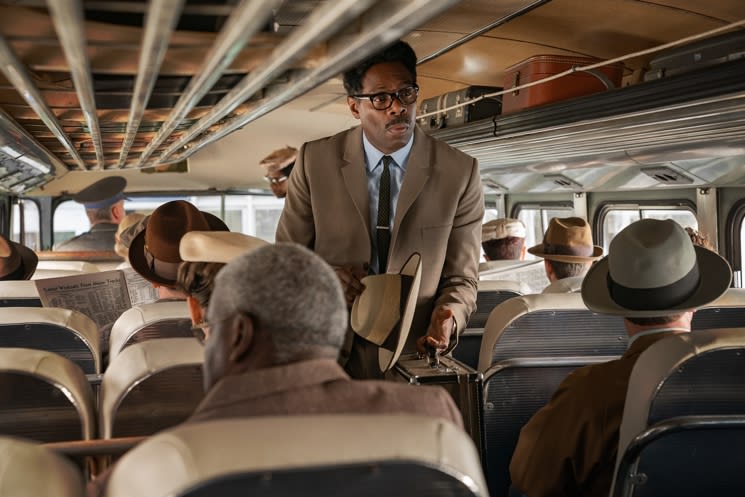Among the list of civil rights leaders and activists from the '60s and '70s, Bayard Rustin's name is not one that comes up often. Practically speaking, this could be explained because Rustin worked primarily behind the scenes. Historically speaking, his absence could be explained by an idealogical change towards neoconservatism later in his life. But, realistically speaking, Rustin's lack of recognition was, at least in large part, due to his sexuality.
George C. Wolfe's latest film, Rustin, seeks to close this gap and give space to an integral member of the civil rights movement, particularly highlighting his work organizing the March on Washington, where Dr. Martin Luther King Jr. delivered his historic "I Have a Dream" speech. The biopic focuses primarily on the events leading to this protest, keeping flashbacks to a minimum, and also incorporating aspects of Rustin's personal life into the mix.
Colman Domingo stars as Rustin in a performance that has already garnered awards buzz. It's a stirring turn that is bolstered by a strong screenplay by Julian Breece and Dustin Lance Black, providing multiple rousing speeches. Given the lack of pre-existing knowledge the majority of audiences will have going into the film and the lean runtime (106 minutes), Domingo's job is a difficult one. But we're given an impressive breadth of understanding of who Rustin was and why his work and influence was so important to those around him thanks to Domingo's gentle and powerful portrayal of the man.
Working alongside Domingo is an impressive cast. Aml Ameen as Dr. King has the impossible task of taking on one of the most well-known figures in American history, and he does so with aplomb. Glynn Turman and Jeffrey Wright both exemplify the importance of casting the best possible actor in smaller supporting roles, as they both bring gravitas and depth to the ensemble.
There's nothing particularly remarkable about the execution of Rustin as a film. It plays out in a similar fashion we've come to expect from biopics, with Domingo's performance as the shining star. What is remarkable about the film, though, is the story it tells. The March on Washington and its significance to the civil rights movement has been well documented, and the idea that such a key figure has gone unacknowledged for so long feels unbelievable. In that way, Rustin illustrates the power of film as a medium, and why a diversity in voices and stories should continue to prevail.
(Netflix)George C. Wolfe's latest film, Rustin, seeks to close this gap and give space to an integral member of the civil rights movement, particularly highlighting his work organizing the March on Washington, where Dr. Martin Luther King Jr. delivered his historic "I Have a Dream" speech. The biopic focuses primarily on the events leading to this protest, keeping flashbacks to a minimum, and also incorporating aspects of Rustin's personal life into the mix.
Colman Domingo stars as Rustin in a performance that has already garnered awards buzz. It's a stirring turn that is bolstered by a strong screenplay by Julian Breece and Dustin Lance Black, providing multiple rousing speeches. Given the lack of pre-existing knowledge the majority of audiences will have going into the film and the lean runtime (106 minutes), Domingo's job is a difficult one. But we're given an impressive breadth of understanding of who Rustin was and why his work and influence was so important to those around him thanks to Domingo's gentle and powerful portrayal of the man.
Working alongside Domingo is an impressive cast. Aml Ameen as Dr. King has the impossible task of taking on one of the most well-known figures in American history, and he does so with aplomb. Glynn Turman and Jeffrey Wright both exemplify the importance of casting the best possible actor in smaller supporting roles, as they both bring gravitas and depth to the ensemble.
There's nothing particularly remarkable about the execution of Rustin as a film. It plays out in a similar fashion we've come to expect from biopics, with Domingo's performance as the shining star. What is remarkable about the film, though, is the story it tells. The March on Washington and its significance to the civil rights movement has been well documented, and the idea that such a key figure has gone unacknowledged for so long feels unbelievable. In that way, Rustin illustrates the power of film as a medium, and why a diversity in voices and stories should continue to prevail.
